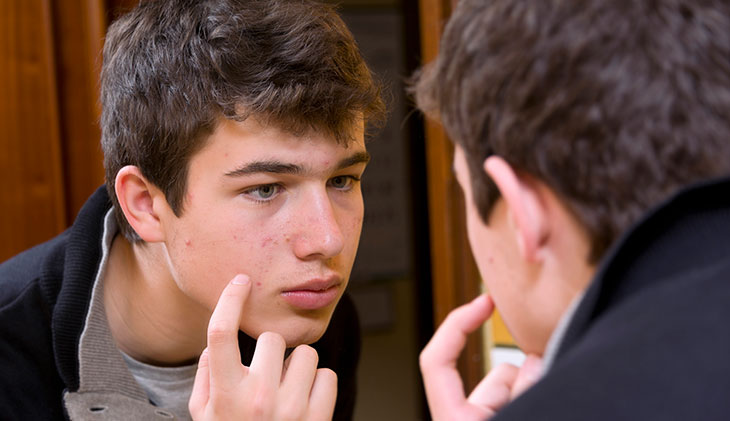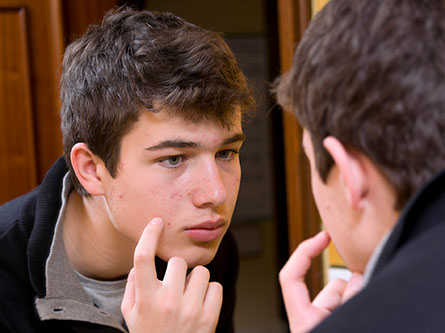
Acne shows up for many teenagers and can linger for several years into adulthood. The good news is that doctors have a few more tricks for treating it than when the parents of today's teens were young. Learn more about what causes acne, treatments and more from UC Davis Health dermatologists.
What is acne? What causes acne?
Acne includes pimples, whiteheads (or pustules), blackheads, and cysts. It occurs within tiny pores associated with hair follicles on the face, chest and back that become irritated or inflamed. Tiny oil glands around these follicles are stimulated by hormonal changes during puberty to produce oily sebum.
In acne, the follicle's opening gets blocked, preventing the oil from escaping normally. The blocked pore is commonly called a whitehead. Blackheads occur when whiteheads are exposed to air. Sometimes bacteria multiply within the plugged pores, causing tender, red pimples. If the pore also becomes filled with pus and fluid, that causes painful cysts.
Learn more about what causes acne
At what age is acne most common?
Those who don't develop acne as a teenager are a lucky minority. An estimated 85% of teens get acne, usually starting at age 11 for girls and a couple of years later for boys. Acne can last through the teen years and into the early 20s. Some older adults may continue to be bothered by it. Many women note that it worsens just before menstruation and disappears during pregnancy. However, this close relationship with the menstrual cycle may be caused by hormonal acne.
Hormonal acne is mostly associated with painful cysts along the jawline and chin area, rather than the typical oily areas of the face, like the forehead, nose, and cheeks. In general, hormonal acne does not respond well to traditional medications used for teenage acne. Instead, it requires medications that block the effects of hormones in the skin.
Sign up for our Health Highlights e-newsletter
How can I clear up my acne?
Many "don'ts" our parents handed down to us about treating acne still apply. Don't pick at, squeeze or roughly scrub pimples. Fortunately, most foods do not cause acne, including chocolate. Also, no special diet has been found helpful in controlling acne. However, studies suggest dairy may cause acne to worsen in some patients.
Simple treatment of acne involves keeping the skin clean, which helps shed old skin. Other helpful tips to prevent acne include the following:
- Wash your face daily with warm water and mild soap.
- Keep hair clean and free of oily pomades to avoid acne around the scalp.
- It's helpful to use over-the-counter medications that contain benzoyl peroxide or salicylic acid once or twice daily. This promotes skin shedding and is mildly anti-bacterial.
- Girls should be careful about which types of makeup they use.
- While lipstick and eye makeup are fine, it's recommended that they use blushes and foundations that say "non-comedogenic" on the label. All major brands should have these types of products.
- Avoid using mineral-based makeup powder as these can worsen or even cause acne.
- People often note that their acne improves in the summer. This is likely because sun exposure increases skin shedding. However, the risk of skin cancer far outweighs the benefits of reducing acne. Always wear sunscreen outdoors and never "treat" acne with sunbathing or tanning parlors.
What are some treatments for severe cases of acne?
Consult your primary care doctor or a dermatologist (physician specializing in skin care) if you or your child's acne is severe. This includes the development of cysts or scarring, or if acne doesn't improve after two to three months of over-the-counter treatments. They may recommend medications that more strongly promote skin shedding, such as those based on vitamin A, including tretinoin (or Retin A).
Doctors may also prescribe antibiotics, either taken by mouth or applied directly to the skin. Steroid injections can also be helpful for patients who scar severely. For those with acne that leaves scars, chemical peels, dermabrasion, and laser techniques can even out the skin after the stage of active acne is over.
Isotretinoin (commonly known as Accutane) is a highly effective, oral medication used for more severe acne. Physicians often do not prescribe this medication for women who are sexually active unless they are using two reliable birth control methods. This is because the medication can result in birth defects if a woman uses it during pregnancy. Isotretinoin is carefully regulated by the U.S. Food and Drug Administration (FDA) for this reason as well as the need to monitor side effects monthly. Many patients who use isotretinoin never have acne again after completing 5-6 months of treatment.
Why should parents help their child with acne treatment?
The teenage years are important to forming a positive social identity. A teen's appearance becomes closely linked with his or her self-esteem. With so many good acne treatments available, there's no reason to suffer this problem until it goes away. Parents are encouraged to take acne seriously and treat it. Also, adults who continue to have moderate to severe acne problems should not hesitate to seek professional advice.
This blog was medically reviewed by Jason Hawkes, associate clinical professor of dermatology at UC Davis Health.




